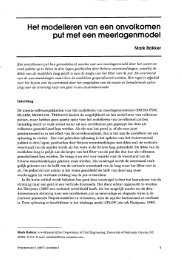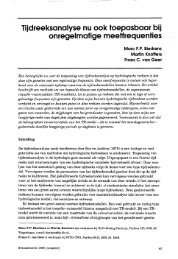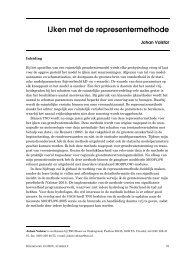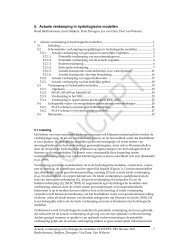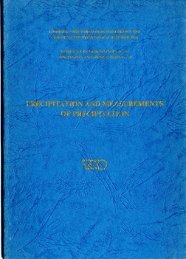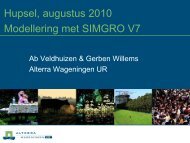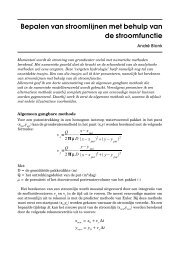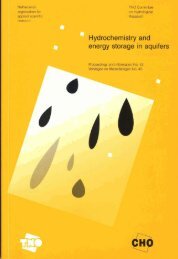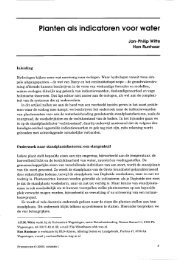Hydro-ecological relations in the Delta Waters
Hydro-ecological relations in the Delta Waters
Hydro-ecological relations in the Delta Waters
Create successful ePaper yourself
Turn your PDF publications into a flip-book with our unique Google optimized e-Paper software.
Grevel<strong>in</strong>gen. Lake Veere and Krammer-Volkerak, <strong>the</strong> area of salt marshes<br />
Fn <strong>the</strong> South-West Ne<strong>the</strong>rlands has been dwished and is at <strong>the</strong> moment<br />
no more than ca. 30% of that <strong>in</strong> 1990. If we Look at <strong>the</strong> area of higher<br />
salt marshes thi. decl<strong>in</strong>e is even more dramstical. Especially <strong>the</strong>se<br />
higher salt marshes are a valuable and rare type 05 ecosystem, with d<br />
number of endangered animal and plant species. For this reason kigh<br />
priority must be given to conserve <strong>the</strong> rema<strong>in</strong><strong>in</strong>g 5aSt marshes <strong>in</strong> <strong>the</strong><br />
Oosterschelde and Westerschelde. In <strong>the</strong> Oosterschelde <strong>the</strong> sediment<br />
balance <strong>in</strong>dicates that <strong>the</strong>re are hardly any perspecti~es for <strong>the</strong><br />
development of large new salt marshes. On <strong>the</strong> o<strong>the</strong>r hand <strong>the</strong> largest<br />
part of <strong>the</strong> rema<strong>in</strong><strong>in</strong>g saltmarsh area is formd <strong>in</strong> <strong>the</strong> eaptern part of<br />
<strong>the</strong> Westersdtelde (ca. 80%). Enviromnent is under great pressure here<br />
hecause of chemical pollutiw of water and soil (Bijlsma and Kuipers.<br />
1989) and <strong>the</strong> predicted eroaion as a consequence of <strong>the</strong> proposed<br />
enlargwnt of <strong>the</strong> shipway to Antwerp.<br />
However, <strong>the</strong>re are also a lot Of positive effects as a consequence of<br />
<strong>the</strong> works. In <strong>the</strong> first years after <strong>the</strong> r~mplation of <strong>the</strong> dams, <strong>in</strong> <strong>the</strong><br />
new habitats impostant populations of breed<strong>in</strong>g birds have been<br />
established, <strong>in</strong>clud<strong>in</strong>g several rare species. Many of <strong>the</strong>se were<br />
formerly quite connnoo, <strong>in</strong> our country on shores, <strong>in</strong> marshes or<br />
extensively used agricultural Land. They have decl<strong>in</strong>ed iII recent years<br />
because of drabage or more <strong>in</strong>teneive hu)aan use of <strong>the</strong>ir orig<strong>in</strong>al<br />
habitats. For. some species of terns and waders (e.g. Sandwich Tern.<br />
Little fern, Kentish Plover, Avo~et) <strong>the</strong> <strong>Delta</strong> area is now one of <strong>the</strong><br />
wst important breed<strong>in</strong>g grou&<br />
Eurape.<br />
<strong>in</strong> <strong>the</strong> Ne<strong>the</strong>rlands or even <strong>in</strong> Western<br />
For w<strong>in</strong>ter<strong>in</strong>g buds <strong>the</strong> situation is quite swlar. Large numbers of<br />
herbivorous waterfowl like geese and ducks forage now on <strong>the</strong> grassland<br />
of <strong>the</strong> former tidl flats and salt mrshcs. The West-European<br />
population of <strong>the</strong> Barnacle Goose w<strong>in</strong>ters almost completely <strong>in</strong> <strong>the</strong><br />
Kefherlands and this species visits <strong>the</strong> grasslands along <strong>the</strong><br />
Har<strong>in</strong>gvliet s<strong>in</strong>ce long. However, its orig<strong>in</strong>al habitats strongly<br />
dim<strong>in</strong>ished here because of <strong>the</strong> public water works and <strong>the</strong> change of<br />
agricultural grassland <strong>in</strong> arable fields. Thanks to a nature management.





